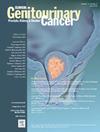联合抑制 AKT 和雄激素受体信号转导治疗转移性抗性前列腺癌的有效性和安全性:系统回顾与元分析》。
IF 2.3
3区 医学
Q3 ONCOLOGY
引用次数: 0
摘要
背景:转移性抗性前列腺癌(mCRPC)预后较差,目前的治疗方案包括化疗和雄激素受体信号抑制剂(ARSI)药物。聚ADP核糖聚合酶(PARP)抑制剂单独或与ARSI联合使用,最近已被纳入缺乏BRCA1/2基因的mCRPC的治疗方案。然而,使用ARSIs下调雄激素受体信号可上调PI3K/AKT/mTOR通路,促进肿瘤细胞存活。这就为同时针对这两种途径提供了理论依据。本系统综述旨在研究AKT抑制剂和ARSI联合疗法:方法:检索了从数据库开始到 2023 年 7 月的 EMBASE、MEDLINE 和 Scopus。主要结果包括客观反应率(ORR)、前列腺特异性抗原(PSA)反应率、不良事件(AE)、总生存期(OS)和无放射进展生存期(rPFS)。采用偏倚风险工具(ROB2)评估质量,采用GRADE评估证据的确定性:共纳入了六项临床试验,其中三项为一期临床试验,一项为二期临床试验,一项为三期临床试验,共有 771 名患者,中位年龄从 67 岁到 70 岁不等。汇总的ORR为30%(5项研究,95% CI,3%-84%),PSA反应率为43%(5项研究,95% CI,15%-77%)。干预组的 rPFS 中位持续时间为 8.2 至 19.2 个月,而安慰剂组为 6.4 至 16.6 个月。据报道,与接受安慰剂治疗的患者相比,接受双重疗法的患者的放射学进展或死亡减少了16%。PTEN缺失状态的降低幅度更大,从23%到61%不等。中位生存期从15.6个月到18.9个月不等。与安慰剂相比,生存期无明显差异。98.8%(767/776)的患者出现任何等级的AE,65.9%(512/776)的患者出现GRADE≥3的AE。最常见的AE和GRADE≥3 AE分别是腹泻(汇总发生率=70%,95% CI,57%-81%)和高血糖(汇总发生率=12%,95% CI,6%-20%):联合治疗降低了rPFS风险,PTEN缺失亚组的反应较高,OS略有增加,但不显著。我们对AE的估计与其他研究一致。任何级别的AE都很常见,大多数人至少经历过1次AE。(PROSPERO注册号:CRD420202352583)。本文章由计算机程序翻译,如有差异,请以英文原文为准。
Efficacy and Safety of Combination AKT and Androgen Receptor Signaling Inhibition in Metastatic Castration-Resistant Prostate Cancer: Systematic Review and Meta-Analysis
Background
Metastatic castration-resistant prostate cancer (mCRPC) has a poor prognosis with current treatment options including chemotherapy and androgen receptor signaling inhibitor (ARSI) medications. Poly-ADP ribose polymerase (PARP) inhibitors alone and in combination with ARSI has recently been incorporated in management for mCRPC deficient in BRCA1/2 genes. However, downregulating androgen-receptor signaling using ARSIs can upregulate the PI3K/AKT/mTOR pathway, promoting tumor cell survival. This creates a rationale for co-targeting both these pathways. This systematic review aimed to investigate AKT inhibitors and ARSI combination therapy.
Methods
EMBASE, MEDLINE, and Scopus were searched from database inception to July 2023. Primary outcomes included objective response rate (ORR), prostate-specific antigen (PSA) response rate, adverse events (AEs), overall survival (OS), and radiographic progression-free survival (rPFS). Quality was assessed using the risk of bias tool (ROB2) and certainty of evidence with GRADE.
Results
Six clinical trials with 3 Phase I, 1 Phase II, 1 Phase III were included with 771 patients and a median age ranging from 67 years to 70 years. The pooled ORR was 30% (n = 5 studies, 95% CI, 3%-84%) and PSA response rate was 43% (n = 5 studies, 95% CI, 15%-77%). The median duration of rPFS ranged from 8.2 to 19.2 months in the intervention compared with 6.4 to 16.6 months in the placebo group. A 16% reduction in radiographic progression or death was reported in patients receiving dual therapy compared with those receiving placebo. This reduction was greater by PTEN-loss status, ranging from 23% to 61%. The median OS ranged from 15.6 to 18.9 months. No significant difference was reported in survival relative to placebo. 98.8% (767/776) of patients experienced AEs of any grade, with GRADE ≥3 AEs occurring in 65.9% (512/776) of patients. The most common AE and GRADE ≥3 AEs were diarrhoea (pooled prevalence = 70%, 95% CI, 57%-81%), and hyperglycaemia (pooled prevalence = 12%, 95% CI, 6%-20%), respectively.
Conclusion
Combined therapy reduced the risk of rPFS, with the response higher in PTEN-loss subgroup, with a modest but not significant increase in OS. Our AE estimates showed consistency with other studies. AEs of any grade were common with the majority experiencing at least 1 AE. (PROSPERO Registration Number: CRD420202352583)
求助全文
通过发布文献求助,成功后即可免费获取论文全文。
去求助
来源期刊

Clinical genitourinary cancer
医学-泌尿学与肾脏学
CiteScore
5.20
自引率
6.20%
发文量
201
审稿时长
54 days
期刊介绍:
Clinical Genitourinary Cancer is a peer-reviewed journal that publishes original articles describing various aspects of clinical and translational research in genitourinary cancers. Clinical Genitourinary Cancer is devoted to articles on detection, diagnosis, prevention, and treatment of genitourinary cancers. The main emphasis is on recent scientific developments in all areas related to genitourinary malignancies. Specific areas of interest include clinical research and mechanistic approaches; drug sensitivity and resistance; gene and antisense therapy; pathology, markers, and prognostic indicators; chemoprevention strategies; multimodality therapy; and integration of various approaches.
 求助内容:
求助内容: 应助结果提醒方式:
应助结果提醒方式:


